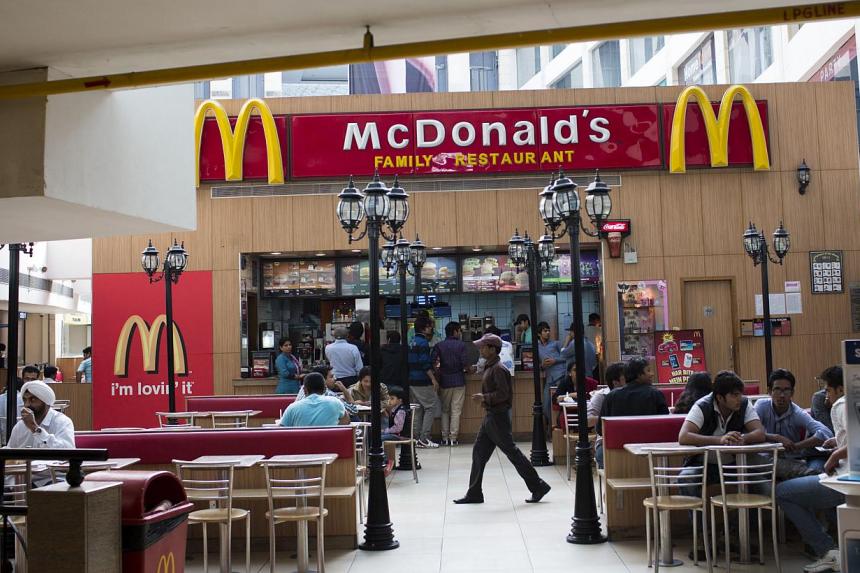MUMBAI (REUTERS) - McDonald's Corp is cutting the amount of calories and salt on its Indian menu as it fights to hold on to customers in a rapidly growing developing market where newer, healthier fast-food options are just starting to catch on.
The burger chain is known globally for the consistency of its food, down to the thickness of fries or the amount of cheese on burgers, and changes run the risk of upsetting customers who expect the same taste on every visit, everywhere.
Amit Jatia, vice president of one of India's two main McDonald's franchisees, said that changes to reduce sodium and calories in fries, buns and sauces had been done gradually, and were subtle enough to keep taste consistent and customers happy. McDonald's has not talked about these changes previously.
"It wasn't as if we suddenly cut the salt in our foods one day. Our menu and sourcing teams have been working to make slight alterations for months now," Mr Jatia told Reuters in an interview.
McDonald's in India has cut sodium in its sauces and buns by 10 per cent and in fries by 20 per cent, Mr Jatia said. Calories in sauces are down by 30-40 per cent over the last six months.
Loyalists interviewed in Delhi, Kolkata and Mumbai said they did not detect any difference in taste. "I order in from McD's at least twice a month and think it tastes pretty much the same," said Rahul Dutta, 29, a marketing executive based in New Delhi.
Mr Jatia heads the south and western McDonald's franchisees in India, running 202 stores and 30 cafes. Another group controls the north and east, with 166 restaurants.
Rising levels of obesity, once just a problem of rich nations that the World Health Organisation says is increasingly affecting low and middle-income countries, has put pressure on fast food chain's globally to offer healthier food.
In a recent corporate social responsibility report, McDonald's said that by 2020 it aimed to offer sides of salads, fruit or vegetables as a substitute for fries in its value meals in 20 major markets.
The reduction of salt in fries, buns and nuggets was part of a global push to reduce sodium levels in its food, McDonald's said, while the reduction of oils in sauces was a local initiative in India. The changes have reduced the calorie impact of a burger by 7-8 per cent, it said.
The chain trimmed salt in fries at its British restaurants in 2006.
Some analysts think this is the chain's way of getting out ahead of a looming burger war in India.
In its bigger markets like the United States, McDonald's is losing customers to chains like Panera Bread or Chipotle Mexican Grill, which are seen as selling food with fresher ingredients.
In India, where obesity is a growing problem and incidence of diabetes is rising rapidly, more international chains are moving in to challenge McDonald's dominance.
Burger King, Carl's Junior, Johnny Rockets and Wendy's have announced plans or already set up shop, posing stiffer competition to McDonald's and Yum Brand's KFC, which gave been around for about a decade.
Technopak predicts the industry will be worth 490 billion rupees (S$10.71 billion) by 2020, up from 154.4 billion rupees last year.
Like rival Yum Brands, McDonald's has made changes to its traditional menu to suit cultural norms in the majority Hindu country, steering clear of beef and pork while offering vegetarian sandwiches and egg-free mayonnaise.
India accounts for a small portion of McDonald's global sales of US$27.4 billion (S$ 37 billion), but is among its fastest growing markets.

